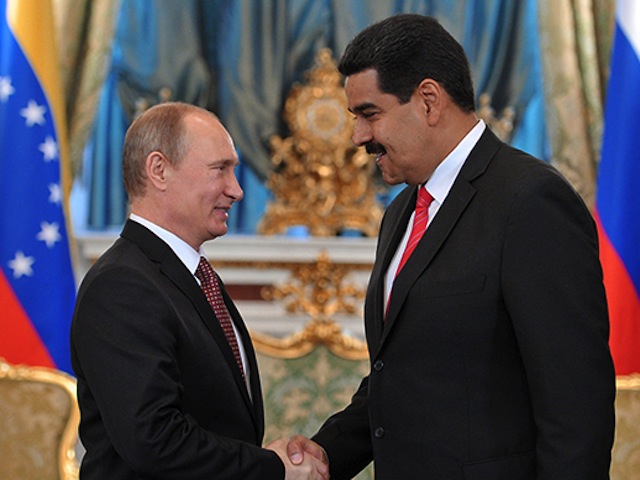 This morning’s key headlines from GenerationalDynamics.com
This morning’s key headlines from GenerationalDynamics.com
- Oil prices crash after OPEC meeting ends in discord
- Oil price plunge pressures budgets of oil exporting countries
- Russia and Venezuela on their knees with oil prices plunging
Oil prices crash after OPEC meeting ends in discord

OPEC
The 12-nation oil cartel, the Organization of Petroleum ExportingCountries (OPEC), ended its meeting in Vienna on Thursday in discord.Poorer members– such as Iran, Iraq, Angola and Venezuela– had beencalling for an agreement where all cartel members would cut productionof oil, in order to force a global increase in the price of oil.
However, Saudi Arabia refused to agree to any such cuts. News of thediscord led to a crash in oil prices. Oil was selling for $100-120per barrel just a few months ago. But on Thursday, West TexasIntermediate plunged to $67.75 a barrel (for January delivery), whileLondon’s Brent North Sea crude nosedived to $71.25.
The plunge in oil prices is occurring because of a glut in the oilmarkets, and the glut in turn is caused by high production anddecreasing demand. A lot of the glut has come about because ofAmerica’s increased production of shale oil (fracking), which has madeAmerica the number one oil producer in the world. Even the OPECcartel, which was supposed to be limiting combined oil production fromthe 12 members to 30 million barrels per day actually produced 30.6million barrels per day in October. The reduction in demand islargely due to slowing growth in Europe and China. Reuters and AFP
Oil price plunge pressures budgets of oil exporting countries
Although the plunge in oil prices will cause a fall in gasolineprices, which is good news for consumers, it’s going to put a greatdeal of pressure on the budgets of oil-exporting countries that werecounting on oil prices above $100 per barrel.
I’ve been listening to a number of analysts throw out differentnumbers for how high oil has to be for each country’s budget tobalance. The following list is a synthesis of all that I heard:
+----------------+--------+' Libya ' $184 ' ' Iran ' $131 ' ' Algeria ' $131 ' ' Venezuela ' $110 ' ' Russia ' $105 ' ' Nigeria ' $100 ' ' Saudi Arabia ' $ 98 ' ' UAE ' $ 80 ' ' Kuwait ' $ 78 ' ' Qatar ' $ 77 ' +----------------+-----------+Table: Oil price per barrel requiredto balance each country's budget
According to analysts, in order for American fracking operations tomake money, oil prices have to be at least $65-70 per barrel.Analysts say that Saudi Arabia is keeping prices low as a long-rangeinvestment in order to suppress America’s fracking industry, and thatSaudi Arabia has enough currency reserves that it can sustain theselow prices for 6-12 months. However, poorer countries will be introuble much more quickly.
Russia and Venezuela on their knees with oil prices plunging

Oil revenue as share of government revenue (Quartz)
When Vladimir Putin first became president of Russia in 2001,oil revenues accounted for just 9% of the Russian economy. In2013, oil revenues accounted for 52% of the Russian economy.On Thursday, the ruble currency slumped to historic lows againstthe dollar and the euro. Even at a price of $80 per barrel ofUrals crude, the federal budget will run a deficit of 2-2.5%.
There’s a feeling that Venezuela is getting its comeuppance with theplunge in oil prices. Hugo Chávez used to stick it to the UnitedStates whenever he could, because high oil prices made his countrywealthy. But instead of saving any of that money, he wasted it onhuge socialist programs designed to buy popularity for himself and forhis party, the United Socialist Party of Venezuela (PSUV). Theseincluded things like subsidizing food so that prices are one-sixthof market prices.
But now Chávez is gone, and oil prices are plunging. His successor,Nicolás Maduro, doesn’t have anything like Chávez’s charisma, so he’sbeen trying to borrow some charisma from Chávez by pretending to beable to talk to him in the afterlife. According to Maduro:
I’m going to confess that a bird approached me, andapproached me again and said … that the commander [Chávez] washappy and full of love for the loyalty of his people … must beproud.
I don’t know how many people believed the talking bird story, butother PSUV politicians are saying things that are much harsher.According to one of Chávez’s cabinet ministers, “It’s painful andworrying to see a Presidency that doesn’t show leadership.” Hecriticized the “repetition of the approaches formulated by ComandanteChávez, without the necessary coherency.”
The broader picture is that the plunging oil prices are part of aglobal deflationary spiral. I said, starting in 2003 when I firstbegan writing about Generational Dynamics, that it was predictingdeflation. Mainstream economists have been predicting high inflationand even superinflation every quarter for years, so they’ve been wrongevery quarter and Generational Dynamics has been right. Quartz and Moscow Times and Panama Post and ABC (Madrid) (Trans)
KEYS: Generational Dynamics, Iran, Iraq, Angola, Saudi Arabia,Organization of Petroleum Exporting Countries, OPEC,Russia, Vladimir Putin,Venezuela, Nicolás Maduro, Hugo Chávez,United Socialist Party of Venezuela, PSUV
Permanent web link to this article
Receive daily World View columns by e-mail

COMMENTS
Please let us know if you're having issues with commenting.